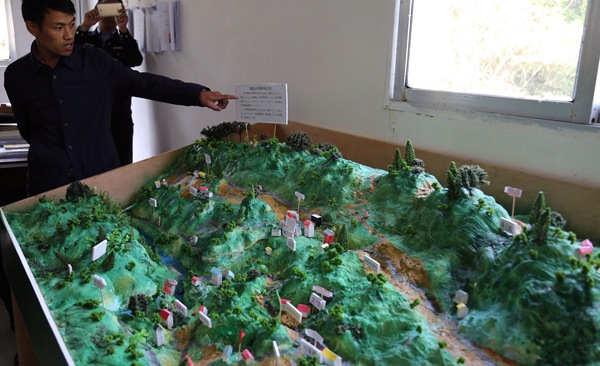Villagers move up from old 'machete'






Tourists and profits
Tourists started arriving in 2011, when a paved road reached the village.
It used to take an hour to reach Siqu town center from the village on foot and another two hours to reach Yanhe county by boat along the Wujiang River, Guizhou's main waterway.
Today, it is a 15-minute drive to the town and another hour and a half by highway to the county seat. Paved roads also reach Tongren, about 300 kilometers away.
The mountains have long made agriculture difficult in Yikoudao.
Only 7 percent-about 60 hectares-of the village's surface area is arable. And only 5 percent of that land can produce crops that require much water, such as wheat.
As a result, the villagers mostly grew corn that they ate and also fed to their pigs.
They would sell it outside to buy other foodstuffs they could not grow, such as rice.
The relocation has enabled the villagers to lease their land for the production of more profitable crops such as medicinal herbs and peanuts.
Farmers who have transferred land rights are shareholders of the companies that use their plots. The villagers will own 20 percent of the shares for the next 10 years, after which they will assume 80 percent control, Xiao said.
The companies also hire villagers as laborers.
A similar plan has transformed relocated families' old houses into heritage sites that draw visitors. The government then distributes a portion of the profits from tourism among relocated villagers, according to He Zhigang, deputy Party chief of Yanhe.
The projects supplement the relocated villagers' incomes.
And Tongren's government offers at least one job opportunity to every household.
The service center in the Xiangtanglong community where Yang lives has so far helped nearly 90 people to find jobs. It has also provided vocational instruction to about 50 residents, who undertake security, construction and domestic work.
Some relatively educated residents help farmers adjust to relocation.
There are three main desks in Xiangtanglong's service center: The first helps low-income residents to apply for government subsidies; the second helps them switch from rural to urban health insurance; and the third enrolls children in local schools.
About 340 families, mostly from Yanhe, have moved into Xiangtanglong since major construction ended last year.
The community boasts a clinic, convenience stores and a square with exercise equipment. A kindergarten, supermarket, public square and cultural activity center are under construction.
- From crested ibises to pandas, China lights conservation path
- Plateau poised for world-class copper hub tag
- Xi calls for winning tough anti-graft battle
- Surging flu cases drive up demand for drug
- Nanchang funds 19 free funeral venues after tragedy
- Massive ice sculpture replicates CNS?Liaoning aircraft carrier

































